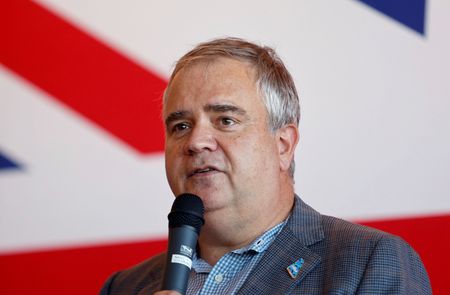 1
1 1
1

By David Shepardson
WASHINGTON (Reuters) -JetBlue Chief Executive Robin Hayes strongly defended the airline’s $3.8 billion plan to buy ultra-low cost carrier Spirit Airlines despite the Justice Department’s lawsuit Tuesday challenging the deal.
“Of course we’re going to continue to offer low fares,” Hayes told Reuters in an interview. “This argument that we’ll take seats outs and fares are going to go up. We’re going to put capacity back,” by doing things such as using larger planes on existing routes and by flying planes more often.
He said that JetBlue will still serve Spirit customers buying very low-cost tickets after a merger and rejected the idea that fares will go up.
“I fully recognize that very price-conscious customer and it’s very important that the larger JetBlue continues to cater and provide a service to that customer and we absolutely will,” Hayes said. “We will not be successful here if we just do not have a product to offer to those customers.”
The Justice Department said the deal would eliminate half of the ultra-low-cost capacity in the United States, resulting in higher fares and 10%-15% fewer seats to airplanes and “harming millions of consumers on hundreds of routes.” If the merger was completed “JetBlue would likely increase prices on every route where Spirit flies today,” it said.
Hayes noted the Federal Aviation Administration is studying whether to set minimum seat requirements and President Joe Biden has criticized so-called “junk fees” like some airline costs.
“The government needs to be clear about what the priorities are,” Hayes said. “JetBlue is the gold standard of leg room and then we don’t like junk fees but we’re thinking an airline that has more ancillary fees is innovative,” referring to the Justice Department’s praise of Spirit.
JetBlue reached a deal with the Florida Attorney General Monday to boost seats on flights to the state by 50% over seven years. “A bigger JetBlue now in Florida means all the airlines flying to Florida to compete with us are going to lower their fares,” Hayes said.
(Reporting by David Shepardson; Editing by Leslie Adler and Stephen Coates)